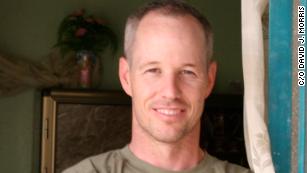The ancient ways suicide continues to haunt us

Father of Sandy Hook victim dies from apparent suicide 03:28
David J. Morris is an English professor at the University of Nevada, Las Vegas and the author of "The Evil Hours: A Biography of Post-traumatic Stress Disorder" (Mariner Books, 2016). The views expressed here are the author's. View more opinion on CNN.
(CNN)On
Monday, Jeremy Richman, 49, father of one of the Sandy Hook school
shooting victims, apparently took his own life in his Newton,
Connecticut, office. The third in a recent spate of
suicides connected to school massacres, Richman's death is doubly
horrific because since his daughter's death, he had devoted his life to
preventing tragedies like Sandy Hook through a foundation he founded and
named after her.
Few
subjects defeat the scientific mind like the subject of suicide.
Because researchers cannot interview the dead, we can never really know
why someone takes this path. It confounds researchers, defies typical
human logic and delivers laser-focused pain to a victim's friends and
family. And it's hard to see any sign of progress. According to 2016
data from the US Centers for Disease Control and Prevention,
suicide is now the second-leading cause of death among people between
the ages of 10 and 34 and the fourth leading cause of death among people
between 35 and 54. In the United States, a country obsessed with gun
violence and murder, there were twice as many suicides as homicides.
On
a certain level, understanding suicide is more of a spiritual question
than a medical one. As Albert Camus put it in "The Myth of Sisyphus,"
"Judging whether life is or is not worth living amounts to answering the
fundamental question of philosophy."
The truth of the matter is that nearly all suicides cause more pain than they prevent, and research indicates that one suicide can breed others.
For this reason, more than one researcher has compared suicide to a
contagion. The waves of the event ripple ever outward, like a stone
dropped into a still pond. As one mother whose son took his own life told journalist Andrew Solomon, "I feel as though my fingers are caught in a slamming door and I've been stopped permanently midscream."
Public
accounts of suicide also help inspire suicidal behavior and elicit
suicidal thoughts. Whenever a major suicide story breaks in the media,
the suicide rate goes up. After Marilyn Monroe's death, which was
reported widely as a suicide, the rate of suicide went up 12%. After Anthony Bourdain and Kate Spade took their own lives in 2018, the number of calls to suicide hotlines across the US spiked by 65%.
One
of the few things we can say with any certainty is that people have
been killing themselves for a very long time and that most religions are
opposed to it. The ancient Greeks looked at life as a gift from the
gods. In Athens those who killed themselves were denied funeral rites
and the hand that had been used to commit the act was severed from the
arm. From its earliest days, the Catholic Church opposed suicide. St.
Augustine, in his argument against it, said that suicide violated the
Sixth Commandment: "Thou shall not murder." Dante took matters a few
steps further in "The Inferno," where those who killed themselves were
condemned to live in the Seventh Circle of Hell as bleeding trees while
being tortured by harpies.
Despite
all the official prohibitions against it, suicide has remained a
constant throughout human history. Achilles, the hero of "The Iliad,"
when he saw the dead body of Patroclus, his friend and
second-in-command, had to be restrained by a fellow soldier, lest he cut
his own throat. The impulse to harm oneself after trauma or the death
of a loved one seems to be rooted deep in human psychology. Nor is the
phenomenon of suicidal behavior as an expression of grief limited to
Western society. As anthropologist Jack Goody noted in his 1962 study of
the West African LoDagaa tribe, the hands of mourners were tied
together with an animal hide as a precaution against self-harm after a
death in the family occurred.
We
will never know what prompted Richman, Sydney Aiello or another unnamed
Parkland student to take their own lives. It's tempting to offer some
hollow version of "thoughts and prayers" for people who have lost family
members to suicide, but as a society we need challenge ourselves to
think more creatively about what to do about it.
Suicide
is a kind of social epidemic seemingly exacerbated by the media and
technology we binge on every day. We are spending more and more time
looking at our phones and less and less time actually interacting with
other human beings who might offer us an outlet to help relieve our
suffering. We are spending more and more time online every day
"connecting" with others on social media, but we've never been more
socially isolated or possessed less self-knowledge. As Jaron Lanier
writes in "You Are Not A Gadget," his 2010 study of internet culture, "You have to be somebody before you can share yourself."
There
are other tangible steps we can take as well. In the US, as one might
expect, guns and drugs are among the most common methods of suicide. The
Veterans Administration -- which is dealing with a suicide epidemic that sees an average of 20 veterans
taking their lives every day -- has a longstanding policy of asking
veterans undergoing treatment for post-traumatic stress disorder if they
can lock up or remove any firearms in their homes in order to prevent
them from killing themselves.
While I don't expect to solve the gun control debate with this logic, research shows that impulsivity plays a huge role
in suicide, so denying high-risk people access to firearms and
dangerous drugs such as opiates could save lives. The most important
thing, however, is to stop repeating the platitudes and start having a
more honest and blunt conversation about suicide.
Many
survivors will be haunted forever by the question which lingers -- "Why
didn't he reach out for help?" Suicide is so many things -- an act of
desperation, a way of ending one's pain, a kind of mass murder and a
kind of mirror held up to our world, a world that many such as Jeremy
Richman found unbearable. As G.K. Chesterton wrote:
The man who kills a man kills a man.
The man who kills himself kills all men.
As far as he is concerned, he wipes out the world.
Stay up to date...
If you or someone you know might be at risk of suicide, here's how to get help: In the United States, call the National Suicide Prevention Lifeline at 800-273-8255. The International Association for Suicide Prevention and Befrienders Worldwide also can provide contact information for crisis centers around the world.




No comments:
Post a Comment